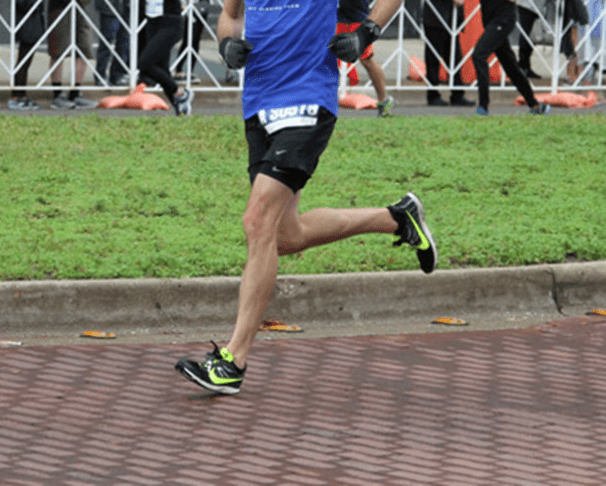Achilles tendon injury can be added to the list of injuries caused by heel strike running. One reason heel strike running is bad for the Achilles tendon is that there’s higher rates of brake loads and compressive impact on the tendon as compared with safer running styles, like forefoot running.
A 2014 study in the journal Sports Medicine reported that high braking forces during running is a major risk factor for Achilles tendon injury whereby heel strike running produces the highest rates of braking.
The reason a higher braking force is produced in heel strike running is that the further back you land on your heel, the more the knee-joint unbends which causes the upper body to lean back instead of forward. This also means that at landing, there’s a large distance separation between the upper body and initial foot strike position. This positional arrangement causes the upper body to come to a crashing halt for a prolonged period of time with the stance leg which exerts straining compression on the Achilles tendon.
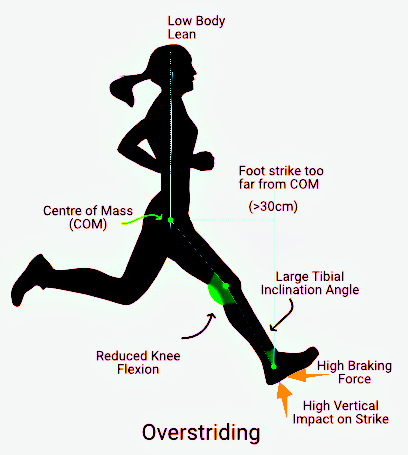

Worse still, a high value of the vertical ground reaction force is loaded under the heel in heel strike running thereby exposing the Achilles to greater shock that initiates degenerative changes within the tendon. This also increases the risk of a repetitive overload stress injury, not just on the Achilles, but elsewhere on the leg, like the shins and knees.
To reduce the time spent braking with the ground, the researchers recommended gait retraining that focuses on directing the upper body to lean slightly forward. This will effectively close the distance between the upper body and initial foot strike position which in turn shortens the brake period and eliminates the initial crash or burst in collisional impact that otherwise occurs when landing with a heel strike when running.
In following the evidence, landing with a forefoot strike (shown below) is the trigger mechanism that naturally engages other mechanical outputs that are good for keeping the brake force to a safe minimal.
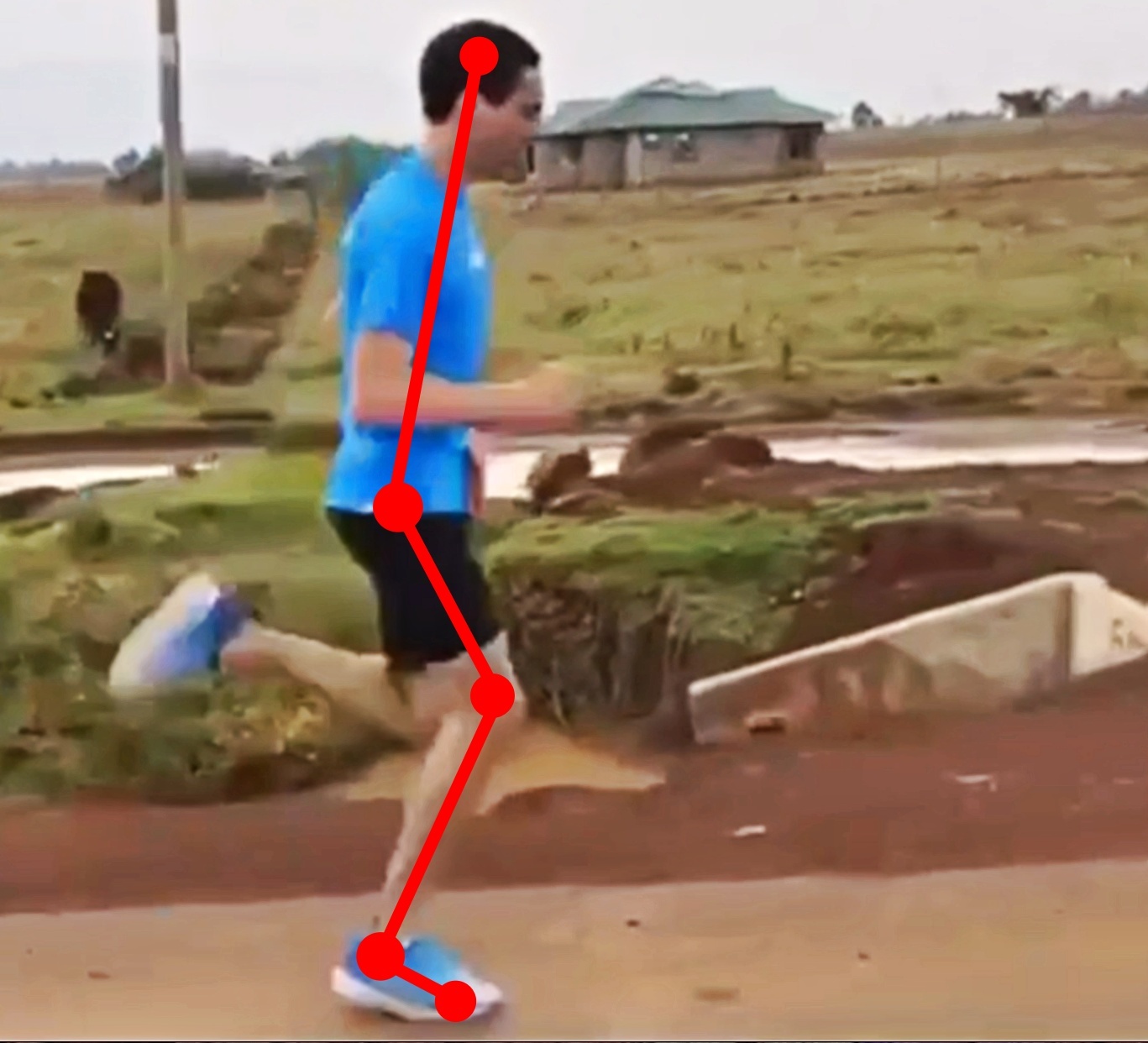

Landing forefoot-first when running has the opposite effect on knee mechanics and upper body posture as compared with heel strike running. For one, landing with a forefoot strike naturally causes the knee-joint to bend at landing. For another, the increased knee bend engaged by striking forefoot-first also reduces unwanted postural sway by preventing the upper body from tilting back, and instead, makes it easier for the upper body to tilt forward.
All in all, one fact that doesn’t get enough attention is that there are major contrasts between forefoot running and heel strike running in that each running style has massively different effects on other aspects of your stride. Forefoot running does a better job at keeping your global biomechanics in a safe range whereas heel strike running causes key mechanical outputs to fall out of neural line, pulling you in the opposite direction (leaning back), therefore injuries will always be on the rise because impact is always too high, even if a thick cushioned running shoe is worn!
Last but not least, it’s hardly new that forefoot running is known to be safer and more efficient than heel strike running. Here is more evidence-backed reasons why forefoot running is proper way to run, not heel strike running!
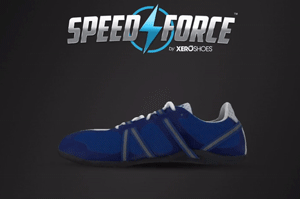
References:
Lormier, AV and Hume, PA. Achilles tendon injury risk factors associated with running. Sports Med, 2014; 44(10):1459-72.
If you’ve enjoyed my blog post on forefoot running vs heel strike running, you’ll love my YouTube channel, RUN FOREFOOT, where you’ll learn more about the health and performance benefits of forefoot running as well as barefoot and minimalist running!
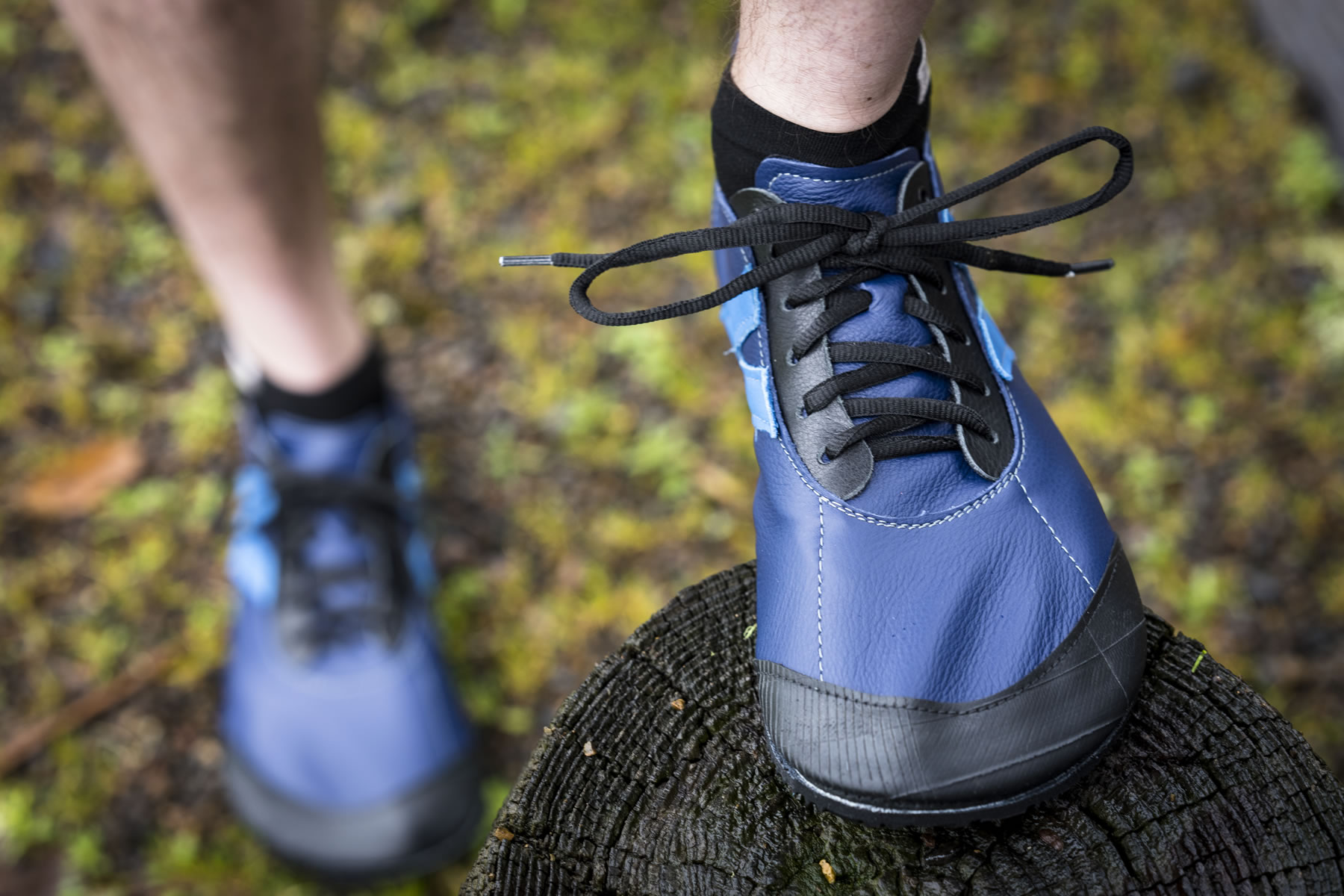
If you’d like, you can support Run Forefoot and help keep it going by making a donation in any amount of your choosing:

Or, you can support Run Forefoot by shopping at the BEST Barefoot Shoe Brands, and be sure to bookmark these links 🙂
Lonowear: https://lonowear.com/?ref=cedsholh
Saguaro: https://www.saguaro.com/?ref=9bVA8fEkmDvB-I
Vibram FiveFingers: https://www.anrdoezrs.net/click-7600968-11372648
Vivobarefoot: https://amzn.to/3vycQOY
Be Lenka: https://www.tkqlhce.com/click-7600968-13947200
Xero Shoes: https://xeroshoes.com/go/Run_Forefoot
Iguaneye: https://www.iguaneye.com/?ref=8tfXVc92
Soft Star Shoes: https://shrsl.com/3mp1b
Wilding Shoes: https://bit.ly/3lIygQP
Bretta Riches
BSc Neurobiology; MSc Biomechanics candidate, ultra minimalist runner & founder of RunForefoot. I was a heel striker, always injured. I was inspired by the great Tirunesh Dibaba to try forefoot running. Now, I'm injury free. This is why I launched Run Forefoot, to advocate the health & performance benefits of forefoot running and to raise awareness on the dangers of heel striking, because the world needs to know.
Latest posts by Bretta Riches (see all)
- Can You Run In Barefoot Shoes? Yes, But DON’T Heel Strike! - 21/07/2024
- Why Cushioned Running Shoes Are Really Bad for Your Feet - 19/07/2024
- Do Cushioned Running Shoes Cause Injuries? - 17/07/2024

